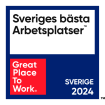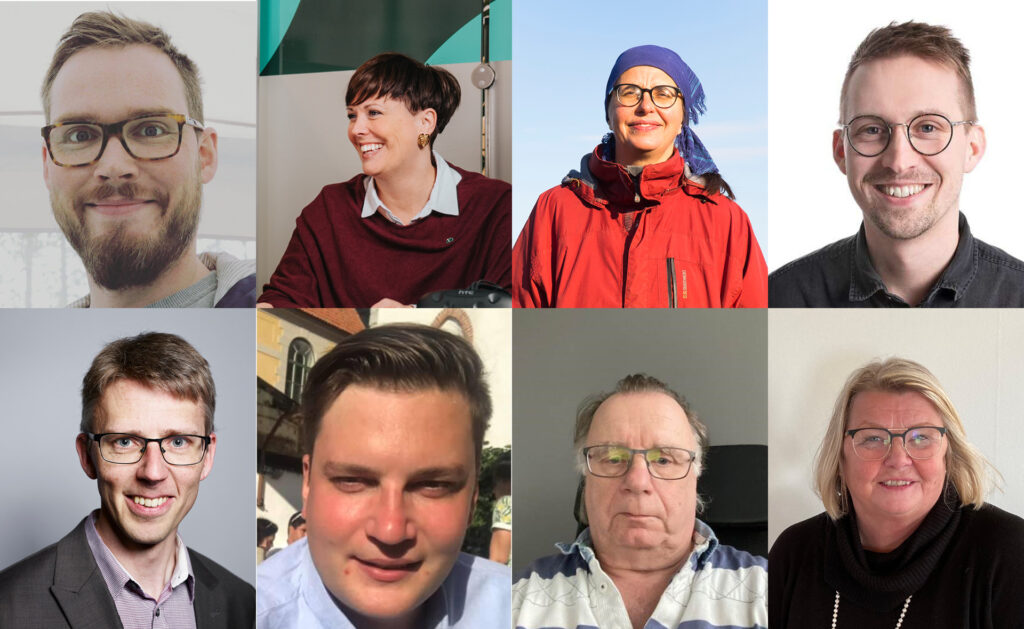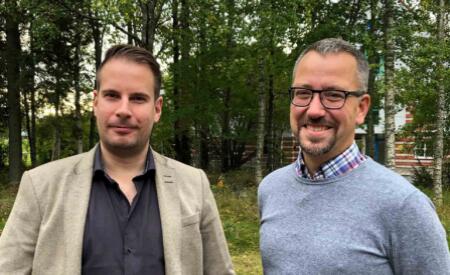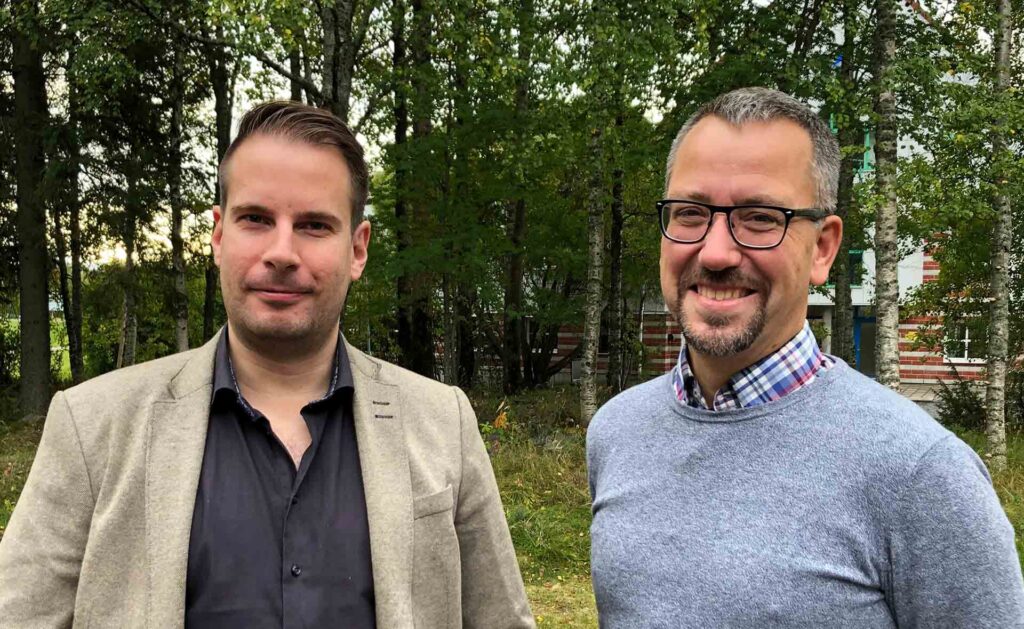Cold, Remote, Connected: Europe’s Arctic wireless platform is a demonstration of place-based innovation and interregional cooperation
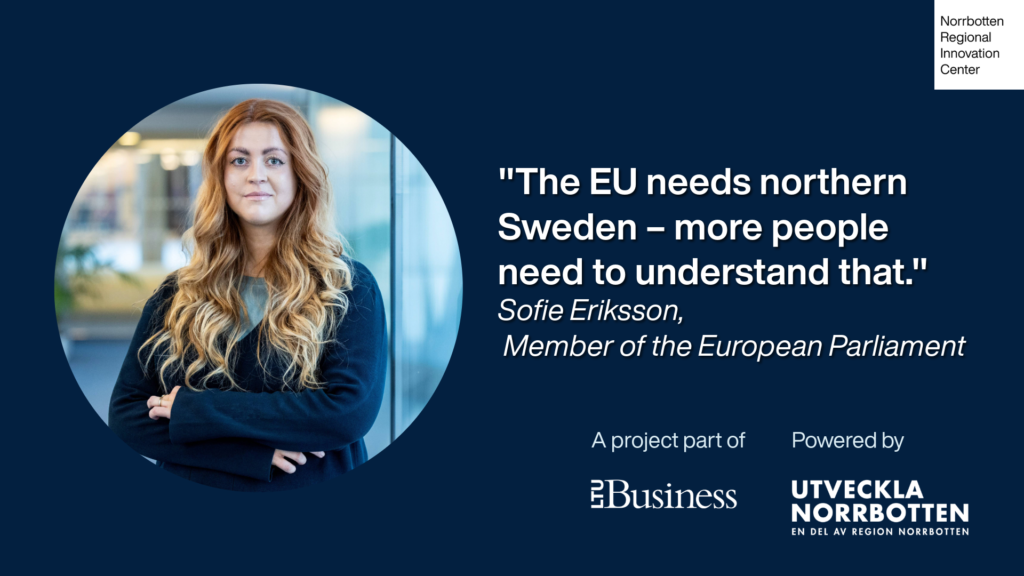
The coming release of OECD report “Building Resilience to Global Transition in the Northern Sparsely Populated Areas” provides crucial insights and over 100 recommendations for Norrbotten and 13 neighbouring regions in Sweden, Finland, and Norway that make up the NSPA (Northern Sparsely Populated Areas).
It highlights both shared challenges and unique opportunities for innovation, sustainability, and economic development in the European Arctic. In light of the report, there are also important lessons on building cross-border innovation ecosystems that other EU regions should take inspiration from.
Sofie Eriksson, MEP, highlights the importance of raising awareness in EU about northern Sweden:
– The EU needs northern Sweden – more people need to understand that. Without the raw materials, experience, and expertise from these regions, industry on the continent won’t function either. It is crucial that the OECD, given its position, highlights how much northern Sweden contributes and that there is, therefore, a shared EU interest in ensuring that the region can truly thrive.
Innovation by necessity: How local conditions in northern Scandinavia drive wireless breakthroughs
Northern Scandinavia’s harsh climate, vast distances, and sparse population pose significant challenges—but also drive groundbreaking wireless innovation.
For more than thirty years, the mantra of Luleå University of Technology’s Center for Distance-Spanning Technology has been “better than being there” – striving to develop technology that is state-of-the-art when it comes to overcoming physical distance.
This mission coupled with bold and early investments in broadband infrastructure made the Norrbotten region a pioneer in developing and deploying virtual meetings, leading to university spinoff Marratech that was purchased by Google in 2009.

When conventional solutions fail, necessity sparks new technology, making the region a leader in broadband expansion, autonomous transport, and satellite communication.
Cross-border collaboration between academia, industry, and policymakers has turned this remote area into a testbed for cutting-edge solutions, offering valuable insights for the EU regional innovation community.
– Digitalization is key to quality of life and societal development in rural areas. Yet, as a consumer market, our local geography and demographic conditions require technology adaptions or even brand new solutions. We partner researchers and labs with the needs owners, business sector and funding agencies to make it happen, says Björn Backe, Director of the Center for Distance- Spanning Technology at Luleå University of Technology.
Technology for communities, industries and local businesses
New wireless industrial applications see the light of day in the underground testbed, the forthcoming 6G test site or the NorthStar Innovation Programme, developed jointly with industry partners and sector technology providers.
In other projects, researchers collaborate with Baltic regions to upscale smart cities into smart regions; and work with local authorities in northern Sweden to explore ways to improve public services such as mobility and accessibility to transport in rural areas.
Supporting resilience and competitiveness in the local business community, the university also run tailored projects such as Green Transition North, raising awareness and supporting the local small- and medium enterprises with advanced technology that allows for circular supply chains and fossilfree energy systems.
Cross-Border Collaboration as a Success Model
Strong Nordic cooperation fuels innovation. Institutions like the University of Oulu and Luleå University of Technology, alongside companies like Ericsson, ABB and Telia, pioneer wireless advancements. The early 2000s Living Labs initiative made Norrbotten a global digitalization leader, proving that user-driven innovation can accelerate EU-wide R&D success.
The engagement from these stakeholders is a thriving nursery for tech SMEs, supported by the local and regional governments by creating physical innovation environments close to academia, as well as anchoring wireless technology in long-term strategies for the region, such as the smart specialization strategy for Norrbotten.
Another example of the close collaboration between the regions is the joint leadership of the European S3-partnership on wireless technology as well as an impressive portfolio of Interreg and I3 projects.
The Future of Arctic Connectivity
Michael Nilsson has a long experience driving wireless technology innovation ecosystems, currently in the realm of Center for Distance-Spanning Technology. For the future of connectivity in the Arctic – and Europe – he champions SME support, collaboration and place-based approach to harness the opportunities.

– The transition to 6G will expand possibilities in e-health, autonomous systems, and creative industries like AR/VR. Security and resilience will also be at the forefront of future innovations. Cybersecurity measures must ensure that autonomous systems —whether in transportation, industry, or energy—operate without exposure to external threats. The EU’s ongoing work on digital resilience strategies can benefit from the region’s experience in building secure, high-performance networks in extreme conditions.
By embracing this approach, the EU can strengthen its leadership in next-generation digital technology. Northern Scandinavia exemplifies how necessity drives technological breakthroughs, with its self-reliant yet collaborative model proving that innovation flourishes at the intersection of resilience, cooperation, and forward-thinking policy.
However, for these innovations to spread across the region and achieve widespread adoption, more is needed. Norrbotten alone spans an area three times the size of Belgium and relies heavily on exports.
To ensure that innovative companies and emerging sectors in the region remain competitive, critical infrastructure investments—such as resilient wireless networks and 5G corridors—are essential.
Are you a fan of regional innovation?
Norrbotten Regional Innovation Center is a collaborative platform to accelerate societal transformation in a smart and sustainable way. This will be done through inter-regional European co-operation.
Meet Per Erik Andersson, the man behind Norrbotten Regional Innovation Center

Per Erik Andersson, strategist at Sweden’s northernmost regional development authority, Region Norrbotten, is the man behind Norrbotten Regional Innovation Center. The initiative will not only strengthen cooperation between local actors in areas such as mining, space technology, tourism, wireless ICT and hydrogen, but also lead to new European partnerships in each area. During a long career in regional development and EU policy, Per Erik Andersson has been responsible for Norrbotten’s two most recent innovation strategies and is currently working on a new one. Here he explains the idea behind a cross-sector regional innovation platform.
Why is an initiative like Norrbotten Regional Innovation Center important right now?
An investment in the Norrbotten Regional Innovation Center is crucial to strengthen the region’s economic position, promote innovation and sustainability, and attract investment and skills in a time of change and uncertainty.
What makes Norrbotten a leading innovation region in the EU?
The region has a strong base in the nature-based economy, which is an important part of the economic fabric and contributes to livelihoods in Europe. Norrbotten and its platforms can act as catalysts for innovation and regional development, strengthening the region’s position as a leading player in Europe.
What does a new collaborative platform hope to achieve?
Norrbotten Regional Innovation Center aims to increase inter-regional partnerships and innovative collaborations in Europe, as well as to amplify innovation in the supply chains of which Norrbotten is part. Norrbotten is strong in raw material production and innovation. This collaboration is expected to lead to increased visibility, sustainable development and a stronger network of collaborations.
Before the holidays, representatives of Norrbotten’s five smart specialisation areas (mining, space, wireless ICT, tourism and hydrogen) met. What insights will you take with you into the new year?
Cooperation between different actors, both local and international, is important. Through networks and partnerships, Norrbotten can attract investment and expertise, which strengthens the region’s ability to develop new ideas and innovations. Therefore, it is crucial to create platforms for cooperation and knowledge exchange to drive Norrbotten’s development forward.
LTU Business is the host organisation for Norrbotten Regional Innovation Center, a project funded by Region Norrbotten.
Finansiär

Meet us at Nordic Hydrogen Valleys Conference 2025
All Nordic countries, on all levels, are working to realise the hydrogen society, where Nordic hydrogen valleys and hot spots are key. Nordic Energy Research invites you to discuss elements related to hydrogen valleys – from Nordic decision making and collaboration, to utilising regional strengths in industry and geography.
Join us at the next Nordic Hydrogen Valleys Conference, where you will have excellent opportunities to interact with and learn from decision makers, hydrogen researchers, and industry professionals.
Shaping the realisation of hydrogen valleys in the Nordic region
Why are the Nordics collaborating on hydrogen valleys? What are the priorities in the Nordic countries and among decision makers? How are these priorities aligned with national energy and climate targets? What desicions are first movers making and how soon will we experience their impact? At the Nordic Hydrogen Valleys Conference 2025, these questions are up for discussion, in relation to topics such as:
Nordic decisionmakers on building hydrogen value chains
Lessons from hydrogen researchers: insights and answers
Mapping Nordic hydrogen valleys: highlighting Nordic strongholds
Registration
Welcome to the team, Olov!
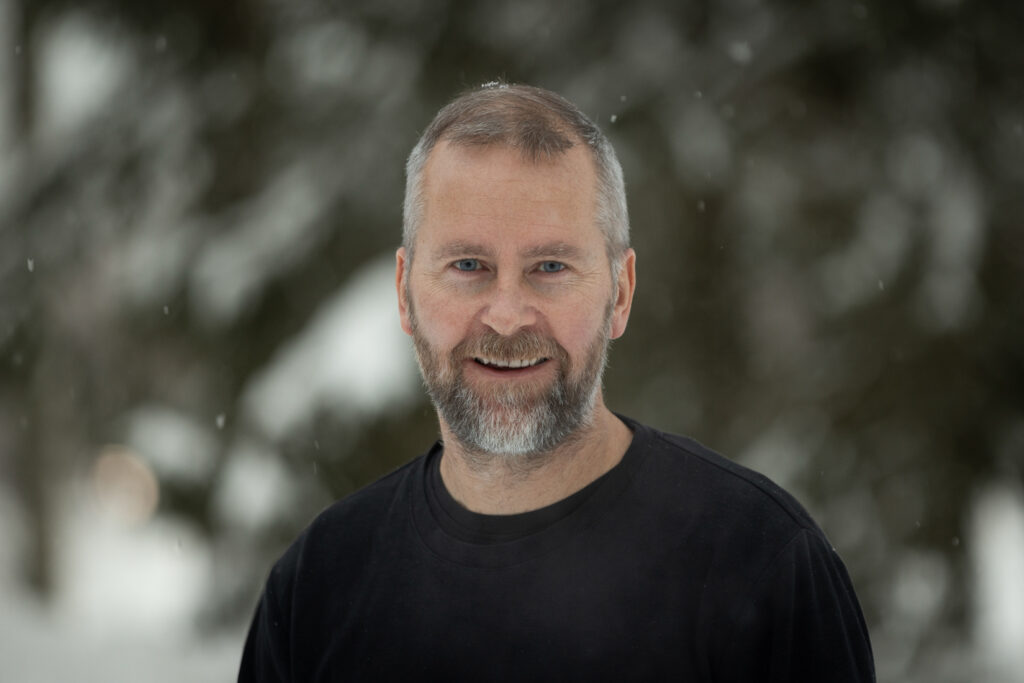
Olov Hultdin is joining our Skellefteå team as senior business developer. He has a long experience within the field, most recently from a privately owned investment company in Skellefteå, No Plan B Invest, where he ran an entrepreneurial school and was involved in two startups, T2 and Green Flight Academy. Olov has a Master of Science in Engineering, specializing in Industrial economics.Hi Olov! Tell us about your role at LTU Business
I want to continue working on helping companies achieve sustainable profitable growth. And perhaps even more than before from an innovation and sustainability perspective. My job involves finding opportunities and problems with our customers. And then helping them to take advantage of the opportunities and solve the problems. I believe the unique access to excellence through Luleå University of Technology and our own expertise here at LTU Business will provide great value to our customers.
What are you most looking forward to?
To learn more about innovation and sustainability. It will be super exciting and I feel that I am in the right place for it.
What is your most important driving force?
To make a real difference when it comes to sustainable growth in Norrland. And having fun in the meantime. I am originally from Malå, so I am passionate about the community development in the hinterland provinces of northern Sweden.
What makes you laugh?
British humor like Fawlty Towers.
We’re delighted to have you on the team, Olov!
Fast Track – an SME programme to boost growth
Participants of the 18-months long diploma course Fast Track get new insights and tools to drive change in their businesses, with focus on growth through for example product development or strategy. Fast Track, now in its’ second rendition, was initiated by LTU Business and Luleå University of Technology.
The participants are individuals with a management position in a company based in Sweden’s northernmost area.
Emma Norrfors, business development manager at LTU Business, has been in charge of recruiting candidates and match-making them with business coaches.
– In Fast Track, the companies get support with analysing their business, as well as identifying the best strategies going forward, all in close collaboration with scientists at Luleå University of Technology and professional business developers”, Emma explains.
Eight small and medium enteprises from industries ranging from construction and manufacturing, through healthcare and food production participate in Fast Track.
Fast Track is led by Anna Öhrwall Rönnbäck, professor and Head of Product Innovation at Luleå University of Technology.
– Close partnerships between the companies and universities benefits the business community overall as well as the economic growth on a national scale. Our ambition with Fast Track is to create fast, sustainable growth for each of the participating companies, and eventually that the concept is introduced to other regions, Anna says.
Background
Fast Track runs from September 2020 to December 2021 as part of the regional developmnet project Samverkan för Innovation och Regional Tillväxt (Cooperation for Innovation and Regional Growth). The project is initiated and operated by Luleå University of Technology in partnership with LTU Business, with sponsorship from EU/ERUF, the Swedish Agency for Economic and Regional Growth, Region Norrbotten, Skellefteå Municipality and Luleå University of Technology.
New programmes to boost tourism entrepreneurs
LTU Business is launching two new programmes for tourism entrepreneurs in Swedish Lapland, starting 2021. The highly appreciated design-focused Turistanläggningars Form & Funktion has attracted over 60 tourism businesses over the years – among the the world famous concept hotel Treehotel as well as eco-champions Camp Ripan. This spring also sees the premiere of business development programme Besöksnäringens Tillväxtakademi – tailored for CEOs in the tourism industry.
The news are met with joy as the industry is fighting for its survival following the Covid-19 pandemic, which has hit Swedish Lapland tourism suppliers particularly hard because of their high proportion of international guests.
– In our conversations with entrepreneurs in the area, the demand for tools to support innovation to adapt and develop new products and markets are stronger than ever. We are incredibly pleased and excited to have secured the funds to meet these needs, says Monica-Äijä-Lenndin, in charge of Turistanläggningars Form & Funktion.
Both programmes aim to boost competitiveness – one with focus on customer experience and concept development together with carefully selected designers and architects and the other – new for this year – with focus on business strategy and analyses.
Both programmes are held in Swedish and open to tourism suppliers based in Swedish Lapland.
Partners

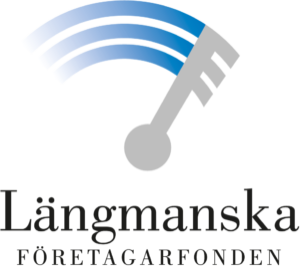

The latest news
Show more
Malta new member in space partnership
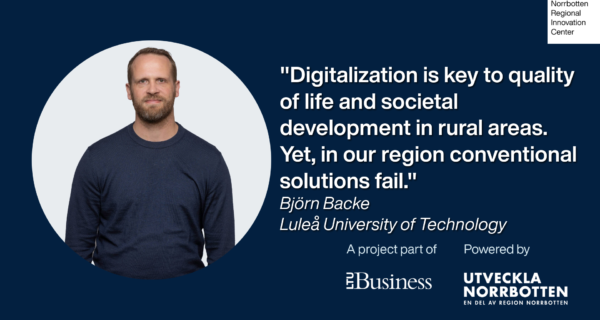
Cold, Remote, Connected: Europe’s Arctic wireless platform is a demonstration of place-based innovation and interregional cooperation
Meet Per Erik Andersson, the man behind Norrbotten Regional Innovation Center

Meet us at Nordic Hydrogen Valleys 2025
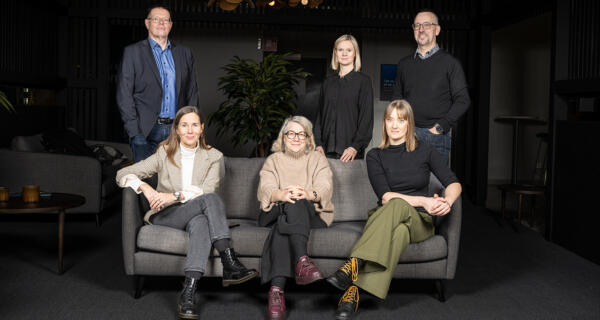
Norrbotten launches regional innovation center

Fem insikter för företag från fullbokat Swedish Big Science Forum
AI to navigate space exploration in new innovation partnership
A new Swedish research partnership will develop game-changing AI-technology for space exploration. The partnership between Luleå University of Technology and OHB Sweden is the latest of 13 new space research and development partnerships launched by RIT2021.
Robotics x space engineering
Space organizations around the world are in a race to develop a technology that makes it viable to send missions to small space objects like asteroids and comets. These objects provide scientists important facts about the origins of life on Earth. They also hold precious metals like iron, gold and platinum that could be used for space construction or be brought back to Earth. The current technology makes it difficult and unprecise to explore small space objects – and therefore unviable as space missions. Something Avijit Banerjee, George Nikolakopoulos at Luleå University of Technology and Per Bodin at OHB Sweden are hoping to change by developing autonomous navigation systems based on artificial intelligence.
Launched by RIT2021
The new research project is funded by RIT2021, a multi-layered injection into the space ecosystem encompassing a budget of 5.6 million Euro. A key focus in RIT2021 is to drive innovation by increasing industry-academia partnerships in research and development. Thus far, RIT2021 has successfully launched 13 such joint collaborations between Luleå University of Technology and space industry partners since 2015. Johanna Bergström-Roos, space specialist and senior project manager at LTU Business runs the EU-funded project, which is a partnership between 12 organisations. She points out that partnerships like these are essential for innovation because their outset and focus create unique benefits.
“The industry gains strategic insights that are important for the future, while academia gets unique opportunities and resources for research. Meanwhile, the very projects themselves job growth and create career opportunities that benefit individuals as well as employers”, says space specialist Johanna.
Read the full story over at ritspace.se
Background
RIT2021 is a regional development project in operation 2019-2021, aiming to boost innovation and cooperation in the space sector. RIT2021 is operated by Luleå University of Technology, LTU Business, The Swedish Institute for Space Physics, Arctic Business and ESA BIC Sweden, with support from SSC – Swedish Space Corporation, OHB Sweden, GKN Aerospace, Region Norrbotten, Luleå Municipality, Kiruna Municipality, Sparbanken Nord & EU. More info on ritspace.se
Further improving the mining industry through NEXGEN SIMS
Solutions for battery-powered mining machines, virtual training environments, 5G communication and drone technology are among the latest breakthroughs in the development of the mining industry. This success is sprung from the recently concluded innovation project SIMS (Sustainable Intelligent Mining Systems). LTU Business now wants to continue the efforts together with industry and academia in a new project: NEXGEN SIMS.
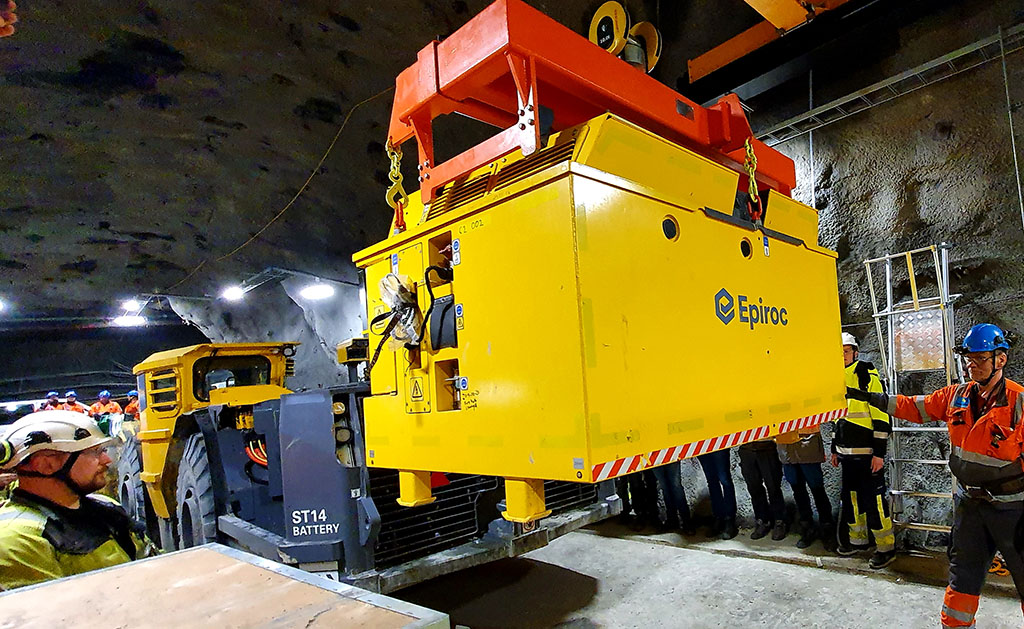
A new generation of battery-powered underground mining machines was tested in Agenico Eagle´s Kittilä mine in Finland in the autumn of 2019. The tests showed great production results and positive health effects for the operators, with an almost silent and vibration-free operation, and improved air quality. Photo: Niclas Dahlström
The completed SIMS project has since its start in 2017 shown that the mining industry can become more sustainable, and that the mine can be made an even more attractive workplace – with the help of autonomous drones, underground 5G technology and battery-powered vehicles.
– Lots is happening in the mining industry in terms of safety, sustainability and efficiency. Modern battery technology replaces diesel, and a higher degree of automation leads to improved safety. Luleå University of Technology conducts research in several areas that are useful for these efforts, says Jenny Greberg, associate professor of mining and quarrying technology at the university, and participant in SIMS.
– Digitizing the mines with smart systems that can communicate with each other will streamline production and create a more sustainable mining industry. We will see more precise mining, less energy consumption, waste and water use, says Jan Gustafsson, senior project manager at the industrial group Epiroc and project coordinator for SIMS.
The SIMS project has received lots of attention both within and outside of Europe. LTU Business and Niclas Dahlström have played a large part in this. – Jenny Greberg, Luleå University of technology
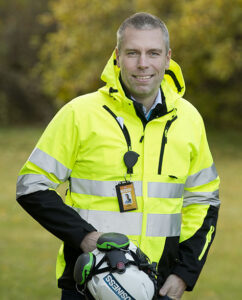
Niclas Dahlström, senior project manager at LTU Business. Photo: Viveka Österman
LTU Business’ senior project manager Niclas Dahlström led the work of communicating SIMS and the project’s results with the world – partly through immersive virtual reality experiences. Now the project owners are hoping for a part two: NEXGEN SIMS, which means a bigger role for LTU Business also including business development of innovations sprung from the project.
– The SIMS project has received lots of attention both within and outside of Europe. LTU Business and Niclas Dahlström have played a large part in this. The work of disseminating the results via digital channels, video and VR environments has been very effective and we look forward to a continued future collaboration, says Jenny Greberg at Luleå University of Technology.
– We are proud to have contributed to the SIMS project. We look forward to bringing that specific experience and our broad international experience of mining innovation into the next project, says Niclas Dahlström.
Three years ago, an announcement in the EU’s largest innovation program Horizon 2020 made it possible for the mining industry and academia to develop and apply new mining technology through SIMS. The EU’s response to the application for NEXGEN SIMS is expected in early 2021.
– Now we are hoping for a positive response from the EU, concludes Niclas Dahlström.
Facts:
The SIMS innovation project began in 2017 and lasted three years. The total budget was SEK 168 million, with the EU providing the bulk of the funding through its framework program for research and innovation, Horizon 2020. Of the total budget, close to SEK 37 million funded Luleå University of Technology’s research, development and innovation of intelligent mining systems. SIMS’ goal was to develop the mining industry in the EU with a focus on growing employment and improving operations in terms of sustainability, safety, and more.
Learn more about the SIMS project at simsmining.eu.
Peak Region visited LTU Business
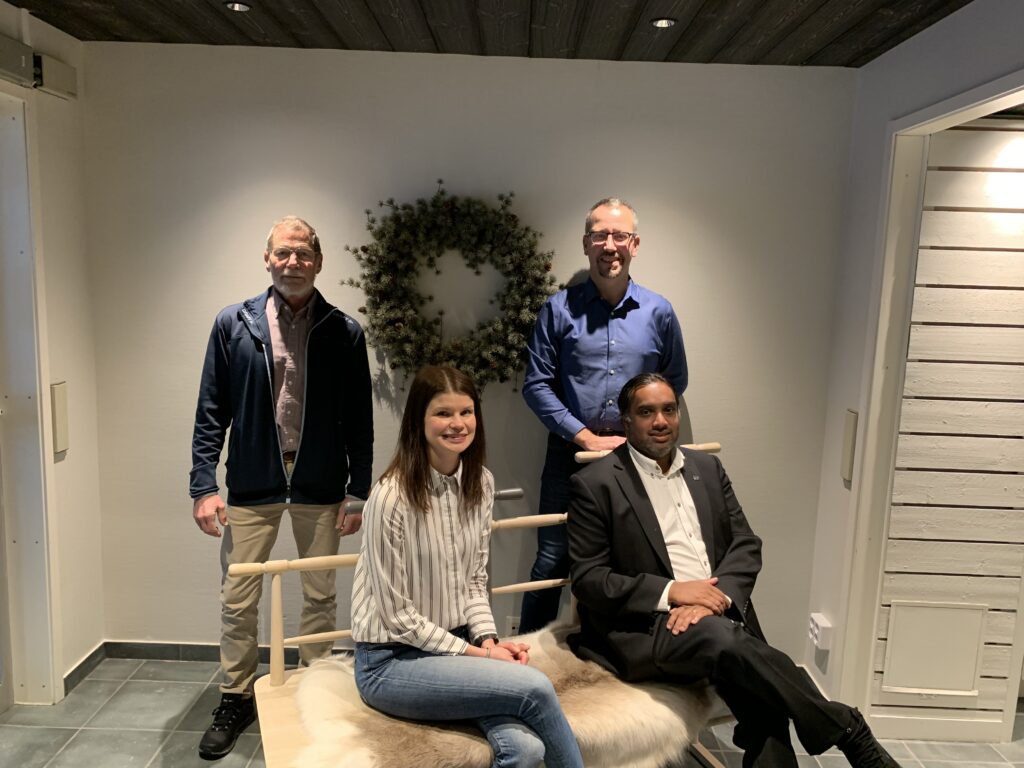
Peak Region contributes to the development of an attractive and sustainable business life in Jämtland Härjedalen. Last week, they visited LTU Business for inspiration and to discuss future collaborations.
The company Peak Region supports innovation in Jämtland Härjedalen and is owned by the public, business and academia (Zenith Foundation, Samling Näringsliv, Region Jämtland Härjedalen and Åre, Krokom and Östersund municipalities). Currently running a project aiming to increase the knowledge among companies in Jämtland Härjedalen regarding the various funding programs provided by the EU, Peak Region visited LTU Business to hear more.
“LTU Business has been successful when it comes to business development processes and analyzes at companies, which we are here to hear more about, as well as to look at future collaboration opportunities between our regions where we have common points of interest,” said Daniel Eurenius who leads the project at Peak Region AB.
Pär Johansson, Strategy Manager at LTU Business added that future collaboration is of value for LTU Business too. “To transfer knowledge and exchange experience are important for gaining new insights, the collaboration with Peak Region generates value in both directions,” he said.
During their visit, Peak Region also met with LTU Business experts in SME funding to find out more about the EU’s major program investments in research and innovation, and how you succeed receiving these types of funding.
“By collaborating with LTU Business on issues concerning SME financing and taking part in their network, we can speed up the development of the support function in Jämtland so that more companies will succeed with applications for innovation and development funds,” said Lina Lif, project manager at Peak Region.
Daniel Eurenius emphasized that an important part of creating success lies in the ability to build networks and collaborations with others:
“Above all, I see that collaboration and partnership between our northern regions in Sweden are strategically important as we share similar challenges in issues concerning our future development and competitiveness. The work of creating innovation-promoting cultures, collaborations and transfer of knowledge between regions will be important in order for us to become strong and attractive in a global perspective,” he concluded.
Germany looks to Arctic Circle for regional strategy
When coal mines are closing in the Rhenisch area in Germany, eyes are turned to the Arctic Circle and the business development company LTU Business. “Northern Sweden is an excellent example where research and business cooperate successfully in this type of change,” says Aarti-Mona Sörensen at the Institute for Advanced Mining Technologies (AMT) at RWTH Aachen University.
It is now official that LTU Business will be commissioned by RWTH Aachen University in western Germany to support building a sustainable, regional innovation system in connection with the closure of coal mines in the Rhenisch area. The region is facing fundamental economic changes over the next two decades in connection with the decommissioning of lignite-based power production and thus lignite production.
“Lignite production and power production play a significant role in the region’s economy. Many SMEs as well as individual employees depend on it. We are now facing the challenge of carrying out a major structural transformation and given Sweden’s experience from this type of project, where research,business and the local communities are collaborating successfully for many years, it feels good to now get help from LTU Business, ”says Aarti-Mona Sörensen, scientific research assistant at the Institute for Advanced Mining Technologies at RWTH Aachen University and project coordinator.
Business developers specialized in regional innovation
When asked why RWTH Aachen University chose to collaborate with LTU Business, Aarti-Mona Sörensen says: “LTU Business has extensive experience in evaluating innovation potential, conducting thorough regional analyses and innovation strategies that create growth,which is valuable to us in the Rhenish area. In addition, we would like to learn how to build a successful innovation ecosystem engaging a variety of stakeholders in the region. We look forward to starting the collaboration. ”
“LTU Business has extensive experience in evaluating innovation potential, conducting thorough regional analyses and innovation strategies that create growth, which is valuable to us in the Rhenish area.”
“Northern Sweden’s innovation system is seen as a precedent around Europe and Luleå University of Technology functions as an engine where – thanks to close collaboration with the business community – clusters of specialist knowledge and innovation have been developed. Our region has come pretty far in the green transformation which means we are being able to help others with their journey, says Pär Johansson, chief strategist at LTU Business.
Project manager Jan Abrahamsson from LTU Business agrees: “It’s great that we have experience and expertise that can benefit other countries and regions. I look forward to getting started on this project together with the Human Technology Centre (HumTec) and the Institute for Advanced Mining Technologies (AMT) at RWTH Aachen University,” he says.
BACKGROUND
Ever since the foundation of Luleå University of Technology in 1971, industry and research have collaborated to promote innovation and development taking into account regional specifications and engaging local stakeholders. This has led to Northern Sweden today being a leading example for large innovation projects, including in the mining industry where LTU Business together with Luleå University of Technology and a number of Swedish industrial companies jointly drive investments, innovations and regional economic development.
THE MINE REWIR PROJECT
Mine ReWir is coordinated by RWTH Aachen University, with the goal to build on the region’s know-how and human resources within mining through creating an innovation network connecting businesses and local government. The first phase of the Mine ReWIR project will begin in September 2020 and end in May 2021, with a potential extension to 2024.
LTU BUSINESS
LTU Business is a business development consulting firm and subsidiary of Luleå University of Technology, working to promote partnerships between academia and the surrounding society, with primary focus on the business community and public sector in northern Sweden and Europe. LTU Business operates in over twenty national and international innovation initiatives within the European mining sector.


